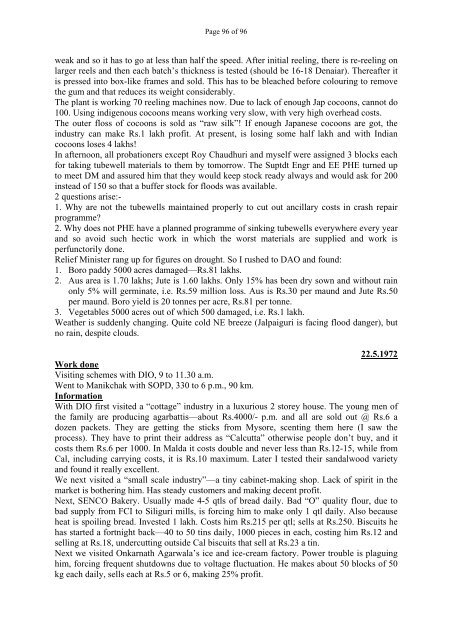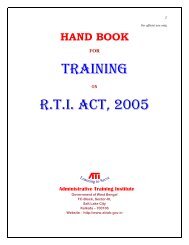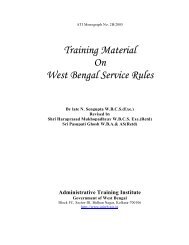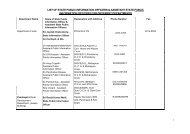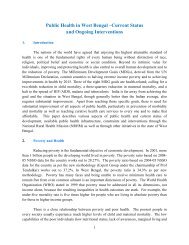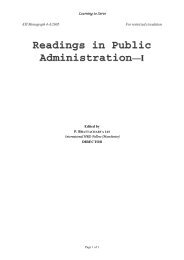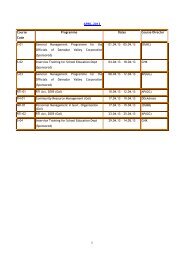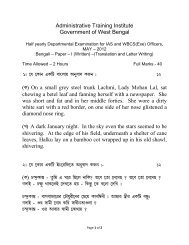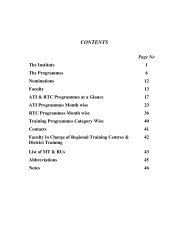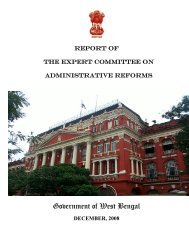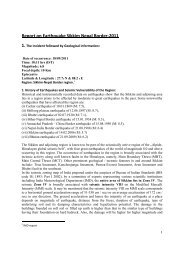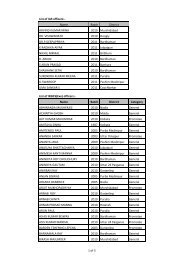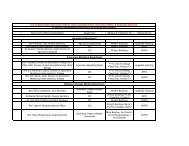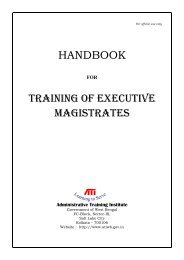Malda Training Diary - Administrative Training Institute
Malda Training Diary - Administrative Training Institute
Malda Training Diary - Administrative Training Institute
Create successful ePaper yourself
Turn your PDF publications into a flip-book with our unique Google optimized e-Paper software.
Page 96 of 96<br />
weak and so it has to go at less than half the speed. After initial reeling, there is re-reeling on<br />
larger reels and then each batch’s thickness is tested (should be 16-18 Denaiar). Thereafter it<br />
is pressed into box-like frames and sold. This has to be bleached before colouring to remove<br />
the gum and that reduces its weight considerably.<br />
The plant is working 70 reeling machines now. Due to lack of enough Jap cocoons, cannot do<br />
100. Using indigenous cocoons means working very slow, with very high overhead costs.<br />
The outer floss of cocoons is sold as “raw silk”! If enough Japanese cocoons are got, the<br />
industry can make Rs.1 lakh profit. At present, is losing some half lakh and with Indian<br />
cocoons loses 4 lakhs!<br />
In afternoon, all probationers except Roy Chaudhuri and myself were assigned 3 blocks each<br />
for taking tubewell materials to them by tomorrow. The Suptdt Engr and EE PHE turned up<br />
to meet DM and assured him that they would keep stock ready always and would ask for 200<br />
instead of 150 so that a buffer stock for floods was available.<br />
2 questions arise:-<br />
1. Why are not the tubewells maintained properly to cut out ancillary costs in crash repair<br />
programme?<br />
2. Why does not PHE have a planned programme of sinking tubewells everywhere every year<br />
and so avoid such hectic work in which the worst materials are supplied and work is<br />
perfunctorily done.<br />
Relief Minister rang up for figures on drought. So I rushed to DAO and found:<br />
1. Boro paddy 5000 acres damaged—Rs.81 lakhs.<br />
2. Aus area is 1.70 lakhs; Jute is 1.60 lakhs. Only 15% has been dry sown and without rain<br />
only 5% will germinate, i.e. Rs.59 million loss. Aus is Rs.30 per maund and Jute Rs.50<br />
per maund. Boro yield is 20 tonnes per acre, Rs.81 per tonne.<br />
3. Vegetables 5000 acres out of which 500 damaged, i.e. Rs.1 lakh.<br />
Weather is suddenly changing. Quite cold NE breeze (Jalpaiguri is facing flood danger), but<br />
no rain, despite clouds.<br />
22.5.1972<br />
Work done<br />
Visiting schemes with DIO, 9 to 11.30 a.m.<br />
Went to Manikchak with SOPD, 330 to 6 p.m., 90 km.<br />
Information<br />
With DIO first visited a “cottage” industry in a luxurious 2 storey house. The young men of<br />
the family are producing agarbattis—about Rs.4000/- p.m. and all are sold out @ Rs.6 a<br />
dozen packets. They are getting the sticks from Mysore, scenting them here (I saw the<br />
process). They have to print their address as “Calcutta” otherwise people don’t buy, and it<br />
costs them Rs.6 per 1000. In <strong>Malda</strong> it costs double and never less than Rs.12-15, while from<br />
Cal, including carrying costs, it is Rs.10 maximum. Later I tested their sandalwood variety<br />
and found it really excellent.<br />
We next visited a “small scale industry”—a tiny cabinet-making shop. Lack of spirit in the<br />
market is bothering him. Has steady customers and making decent profit.<br />
Next, SENCO Bakery. Usually made 4-5 qtls of bread daily. Bad “O” quality flour, due to<br />
bad supply from FCI to Siliguri mills, is forcing him to make only 1 qtl daily. Also because<br />
heat is spoiling bread. Invested 1 lakh. Costs him Rs.215 per qtl; sells at Rs.250. Biscuits he<br />
has started a fortnight back—40 to 50 tins daily, 1000 pieces in each, costing him Rs.12 and<br />
selling at Rs.18, undercutting outside Cal biscuits that sell at Rs.23 a tin.<br />
Next we visited Onkarnath Agarwala’s ice and ice-cream factory. Power trouble is plaguing<br />
him, forcing frequent shutdowns due to voltage fluctuation. He makes about 50 blocks of 50<br />
kg each daily, sells each at Rs.5 or 6, making 25% profit.


